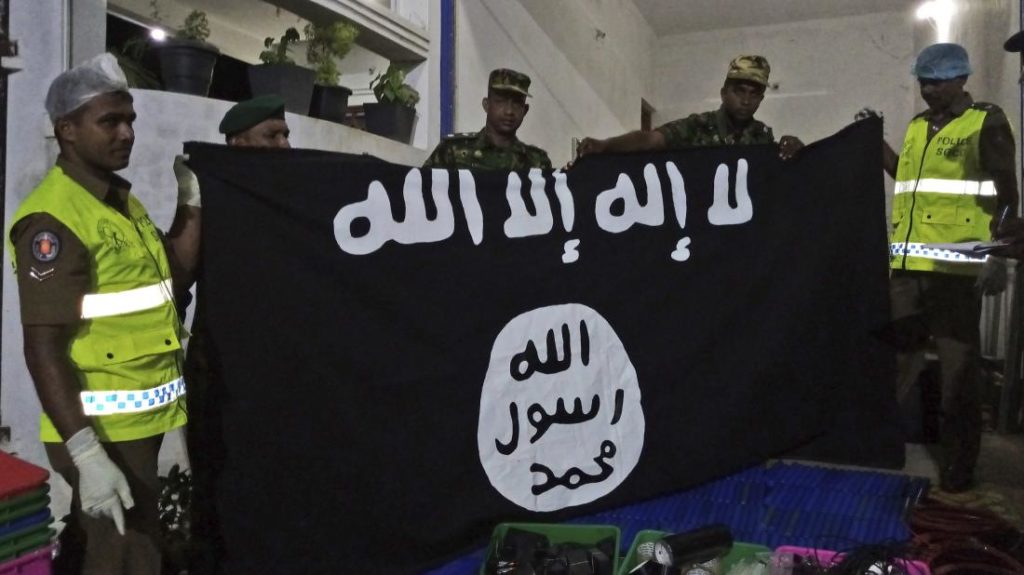The rising specter of the Islamic State in India – I
Shanthie Mariet D’SouzaIndian Muslims in general and especially those in conflict theatres of Kashmir have not made common cause with the alleged sufferings of their fellow Muslims elsewhere in the world;, the prospect of living in a caliphate has also not held out much of an attraction for them.
Photo: Quartz

This is the first in a two-part series on the Islamic State and India
Amidst much speculation and contestation about the presence and strength of the Islamic State ( IS) in India, two developments came in rather quick succession. On 10 May 2019, the IS’s Amaq News Agency claimed that it has established “Wilayah of Hind” (province in India). This demonstrates an attempt by the outfit which had lost much of its footing in Iraq and Syria to gain foothold in new theatres, especially after the Easter Sunday attacks in Sri Lanka. On the same day, Indian security forces in Kashmir’s Shopian distrct killed Ishfaq Ahmad Sofi, a militant associated with the IS. The IS in Jammu & Kashmir (otherwise known as the ISJK), according to security forces, is now left with only about three militants. Between the rhetoric of the IS and the claims of success by the security forces, lies a much larger area of understudied global jihadist mobilization in India. This article attempts to map the threat this phenomenon poses to the security of the country and the region.
Weakness of Global Jihadist outfits
The failure of the IS to ‘rage a storm’ in India needs to be analysed within the broader context of the lack of success of global jihadist organisations to find supporters among Indian Muslims, in the conflict theatres of India like Kashmir. The government of the day has periodically stressed upon the insularity of the Indian Muslims from what was happening in the Middle East, as also near home in Pakistan and Afghanistan. Muslims in general and especially those in conflict theatres of Kashmir have not made common cause with the alleged sufferings of their fellow Muslims elsewhere in the world;, the prospect of living in a caliphate has also not held out much of an attraction for them. The fact that existing militant organisations and overground secessionists foresaw an existential threat from the global jihadists and hence, periodically criticized them, also played a part in limiting the latter’s influence.
Apart from this, two other reasons prevented the growth of either the al Qaeda (AQ) or the IS in Kashmir. First, the AQ and the IS were attempting to find foothold in an extremely crowded jihadist landscape of Kashmir. Outfits like the Lashkar-e-Taiba, Jaish-e-Mohammad, Hizb-ul-Mujahideen etc. have been operating in the region for many years and had captured the imagination of most militant sympathisers, either to fight for independence from India or to merge with Pakistan. The only way for the AQ and the IS to find cadres in such an area was through mass-scale defection of existing outfits and reorienting them towards a goal of an Islamic Caliphate. They only had very limited success in this regard. Secondly, serious attempts by global jihadists, especially the AQ, to open shop in Kashmir started when their influence was waning in their core areas. Announcement of the al-Qaeda in the Indian Subcontinent (AQIS) was made in September 2014. By then the AQ central had weakened significantly. No one wanted to be a part of a lost cause.
As a result, barring a dozen militants who were part of the Zakir Musa-led Ansar Ghazwat-ul-Hind (AGH) and few others who joined the ISJK, Kashmir’s contribution to global jihad was almost non-existent. A lone youth, Aadil Ahmad Wada of Jawahar Nagar locality of the Srinagar city, is known to have travelled to Iraq and Syria to join the IS. Adil, who has an MBA from Queensland University in Australia, joined the organisation in 2013. He is now reportedly being held as a prisoner in Syria by the US-led coalition forces.
(The author is Founder & President, Mantraya; Teacher in Defence and Strategic Studies; Member of Research & Advisory Committee, Naval War College, Goa; Board Director, Regional Centre for Strategic Studies, Colombo. This is the first of a 2-part series on the Islamic State and India)
An excellent brief. I look forward to the second part.